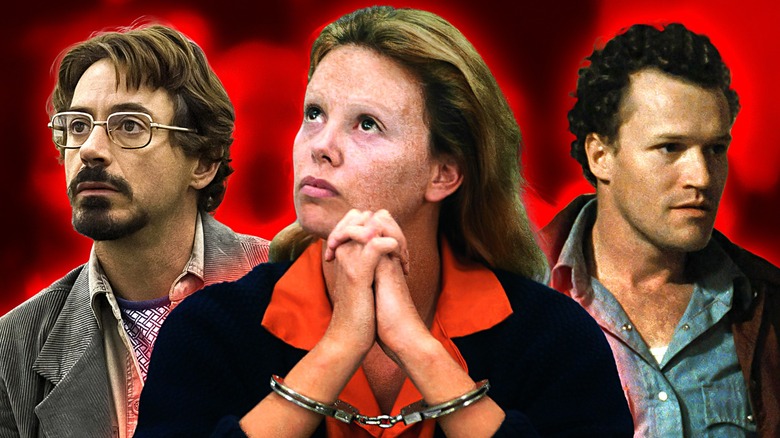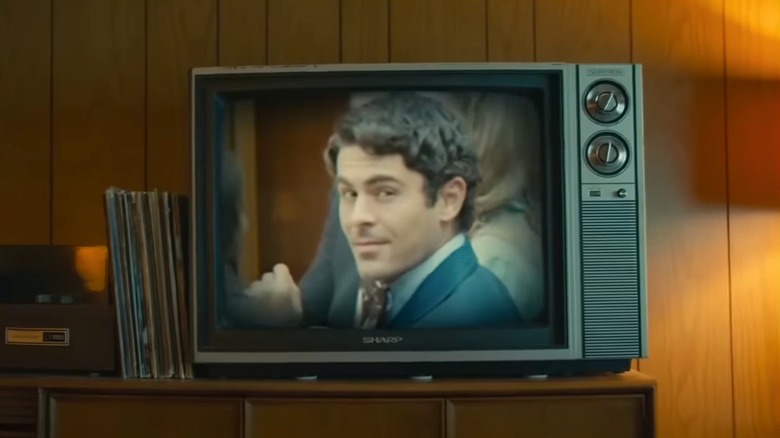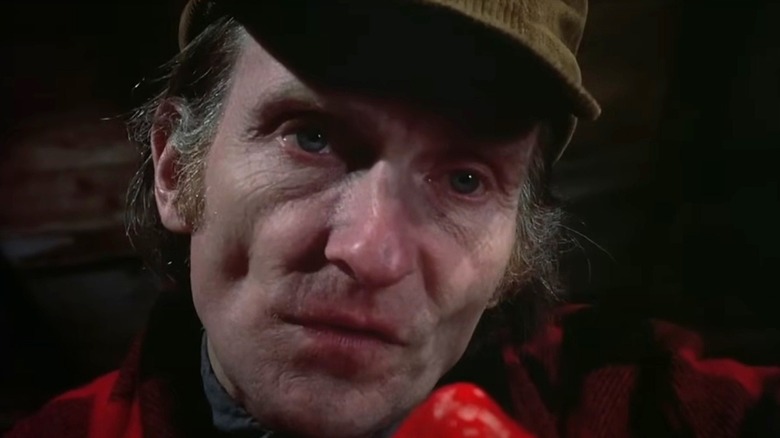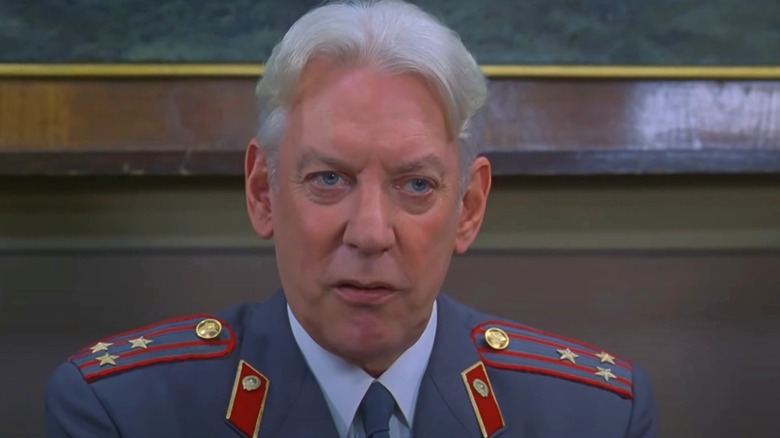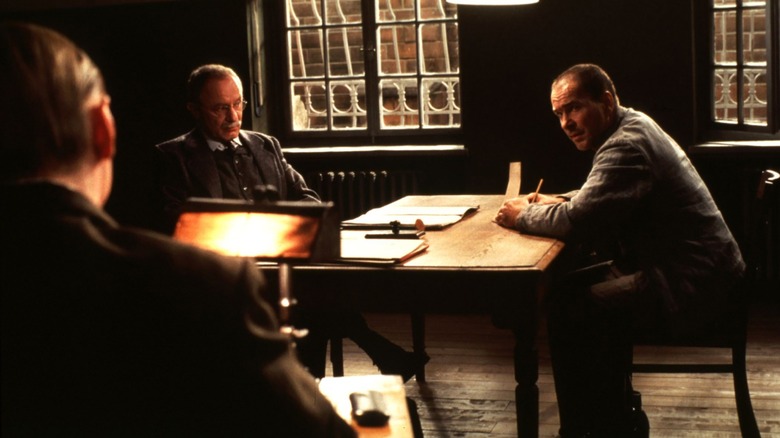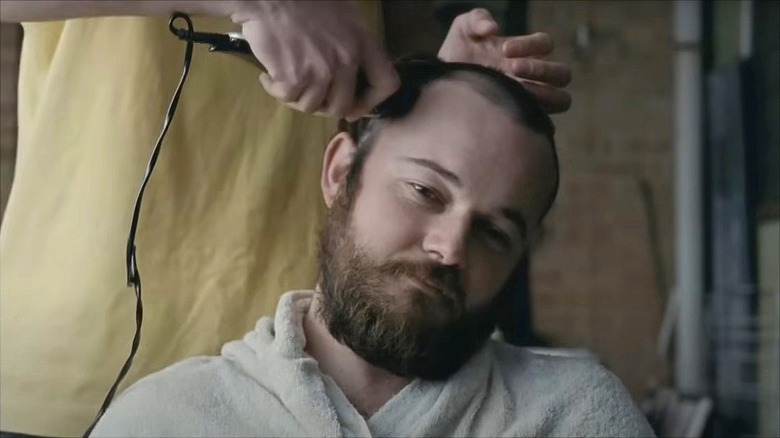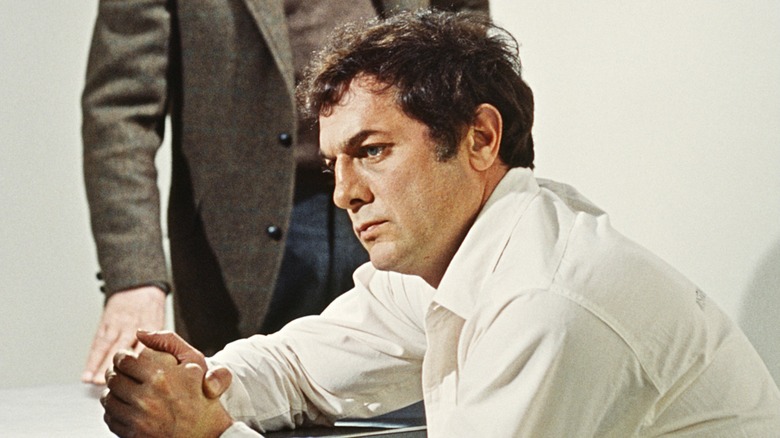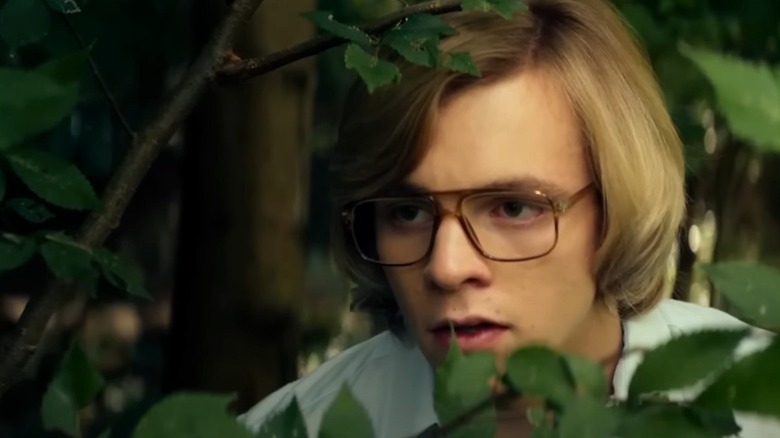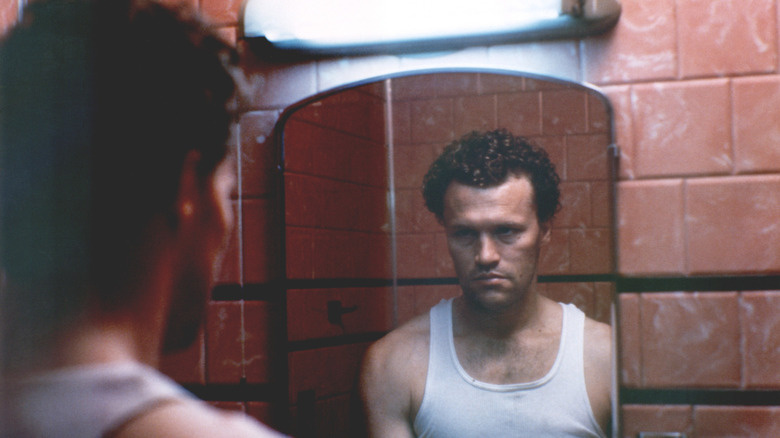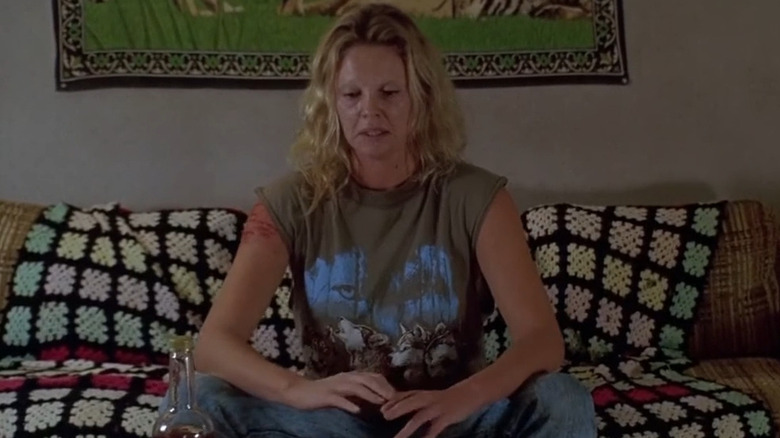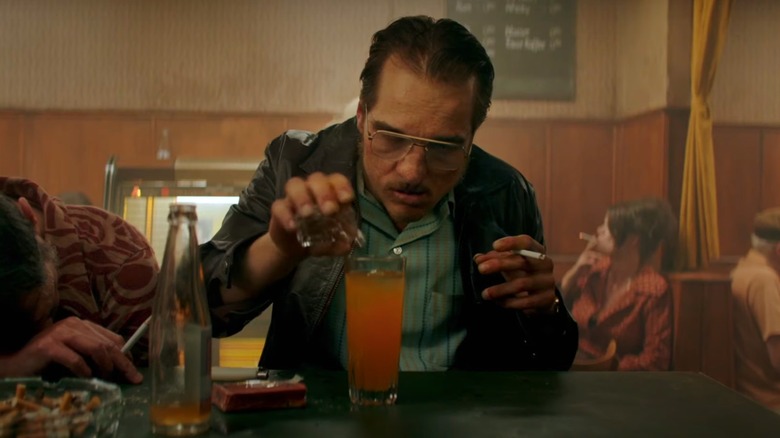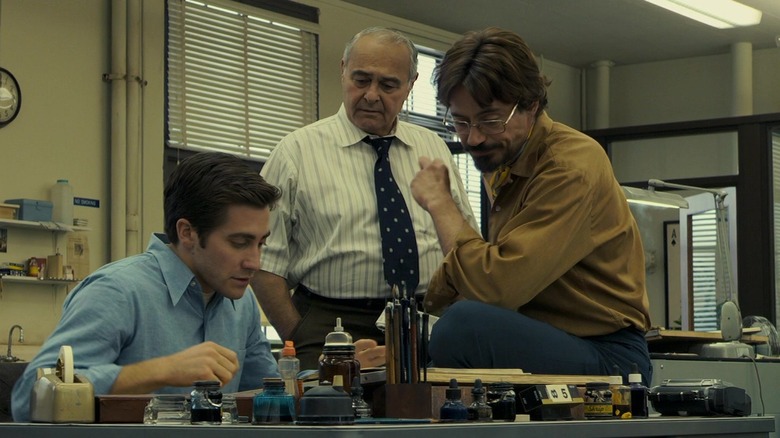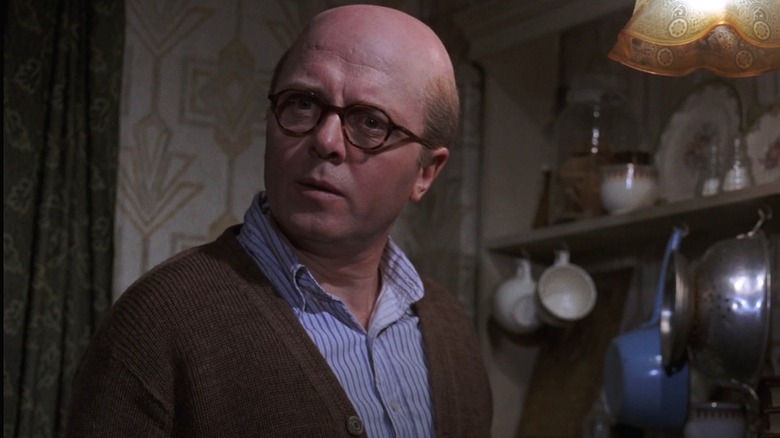The 12 Best Movies About Real-Life Serial Killers, Ranked
Real-life serial killers have inspired countless films and TV shows. For instance, "Psycho," "The Texas Chainsaw Saw Massacre," and "The Silence of the Lambs" are all downstream from Ed Gein, the Wisconsin factotum who committed murder, grave robbery, and other grisly crimes during the mid-1950s. These may be great films but they are all strictly inspired by serial killers rather than about them. This article considers those films that depict killers' lives close to how they were rather than creating composite characters and other inventions. It also includes films that may not be entirely faithful to the historical record but are compelling enough to give an insight into real-world killers and their crimes.
These movies aim to capture balanced insight into their subjects. Some, like "Monster," show how abuse begets abuse, whereas others, such as "Citizen X," reflect how prejudice and ideology can allow a criminal to kill unchecked. What these films don't do is provide easy answers. We see the illnesses and experiences behind some killers' crimes, but there is a general sense from these 12 films that there is rarely — if ever — a direct answer to the cause of serial murder. Some entries, like "Henry: Portrait of a Serial Killer," suggest that some people kill simply because they want to — no trauma or insanity, just casual, opportunistic sadism. Such unsettling ideas elevate these fact-based stories above the crass sensationalism often seen in the genre.
12. Extremely Wicked, Shockingly Evil and Vile
There is a better movie to be made about Ted Bundy, America's most infamous serial killer. Whether that film should happen is another topic, but despite the strength of Zac Efron's casting and performance, "Extremely Wicked, Shockingly Evil and Vile" will always be a missed opportunity. The problem is its focus on those around Bundy, namely his girlfriend Liz Kendall (Lily Collins), rather than Bundy himself. Most viewers want to leave a Ted Bundy film with a greater understanding of the person, and that is unlikely to happen when the film pivots not on him but on his partner. However, it would take a tactful filmmaker to depict Bundy's crimes without exploitation.
Anyway, narrative issues aside, "Extremely Wicked, Shockingly Evil and Vile" is not without merit. Efron's performance shatters any remains of "High School Musical," achieving not just a striking physical likeness to Bundy but mirroring his slick, glib manner too. Unfamiliar viewers may learn a few details of Bundy's story, such as his outrageous prison escapes that allowed him to continue his appalling murders, but director Joe Berlinger's film proves misguided, shallow, and broadly sanitized. The one exception is a sequence near the end involving a phone call and a hacksaw that effectively conveys a sliver of the man's bestial crimes.
11. Deranged
"Deranged" came out in 1974, the same year as "The Texas Chain Saw Massacre," another derivative of Ed Gein's crimes. Despite sharing strong exploitation flavors with Tobe Hooper's classic, "Deranged" is far closer to the facts of the case, although there are still numerous deviations.
The first deviation is the lead character's name, Ezra Cobb (Roberts Blossom). Directors Jeff Gillen and Alan Ormsby fictionalized both names and places in the film, reflecting greater sensitivity than the poster's bare skin and scandalous tagline — "Pretty Sally Mae died a very unnatural death!" — suggests. These changes are small details in a narrative that hit the main elements of Gein's life, namely the twisted relationship he had with his mother Augusta, a God-fearing zealot who brainwashed her son into believing sex and women were evil.
The mother in "Deranged" is called Amanda and the film opens with her bloody, bed-ridden death courtesy of Tom Savini, the famous gore expert who would work on the likes of "Dawn of the Dead," "Maniac," and "Friday the 13th." This film is Savini's first feature-length production and is not the best display of his talents; several scares have not aged well. However, the quality of "Deranged" is in Roberts Blossom's performance, which captures Gein's unnerving blend of parochial manner and extremely disturbed psyche. It may be the most accurate depiction of Gein until the third season of Ryan Murphy's "Monster" series, which stars Charlie Hunnam as the notorious killer.
10. Citizen X
"Citizen X" may be a mid-'90s HBO production with a corresponding televisual style — the music is especially distracting — but this adaptation of Robert Cullen's "The Killer Department" is an engaging police procedural that explores the intersections of communist ideology and the universal darkness of human behavior. Soviet bureaucracy could not conceive of a serial killer operating in their socialist utopia, and it was this misguided dogma that helped Andrei Chikatilo — the so-called Rostov Ripper — kill some 52 people over 12 years.
After eight bodies are found in and around communal farmland, General Mikhail Fetisov (Donald Sutherland) — a veteran of military bureaucracy — assigns young forensics specialist Viktor Burakov (Stephen Rea) to investigate the case. Fetisov chooses Burakov because of his focus on expertise rather than ideological allegiance. However, individual bureaucrats and the wider Soviet apparatus stall the investigation with their delusional belief that serial killing is a unique consequence of decadent Western societies, as Chikatilo's crimes remain unchecked.
Again, televisual aesthetics undermine "Citizen X," but Chris Gerolmo's film is a novel and engaging account of serial murder in which pathological violence meets systemic denial.
9. Deathmaker
In telling the story of German serial killer Fritz Haarmann, who killed at least 24 young men in Hanover between 1918 and 1924, director Romuald Karmakar takes Tony Curtis' monologue from the end of "The Boston Strangler" and extends it to feature length. "The Deathmaker" is adapted from interrogation transcripts and interrogation transcripts alone — the film never leaves the room Haarmann (Goetz George) shares with Professor Ernst Schultze (Jurgen Hentsch).
"The Deathmaker" is a rare example of all-dialogue storytelling. The many words spoken over the film's 1-hour-50-minute running time prove that violence doesn't have to be in your face to get under your skin. Haarmann's bloody crimes are described in savage detail, yet there is no judgment or moralizing from the characters or the filmmakers. The film is descriptive, not prescriptive, and it commits itself to a quasi-documentary aesthetic that should compel those interested in the psychological evaluation of extremely violent criminals.
8. The Snowtown Murders
"The Snowtown Murders" is a stark account of the "bodies-in-the-barrels" case that scandalized Australia in the 1990s. Between 1992 and 1999, John Bunting and his accomplices Robert Wagner and James Vlassakis killed 11 people and stored the bodies in a disused bank vault in Snowtown, a small town some 90 miles north of Adelaide.
Bunting was the crimes' driving force, and actor Daniel Henshall is perfectly cast in the role, depicting the killer's surface-level charm, sinister manipulation, and sadistic hatred of homosexuals, pedophiles, disabled people, drug addicts, and those he considered "weak" or "waste."
Director Justin Kurzel uses a kitchen-sink style to capture a strikingly bleak vision of blue-collar Australian life. The film shifts from a glum drama into an unflinchingly brutal account of evil with such visceral cruelty that it borders on unwatchable. "The Snowtown Murders" is in a special class of cinematic realism with superb performances and evocative camerawork, although the slow-burn style can be deliberate to a fault. Still, the film's appropriately ugly depiction of dark triad psychology will sear almost any brain.
7. The Boston Strangler
"The Boston Strangler" got a mixed reception when it opened on October 16, 1968, just four years after Albert DeSalvo was apprehended. Renata Adler of The New York Times attacked the film as an "incredible collapse of taste, judgment, decency, prose, insight, journalism and movie technique." Roger Ebert had ethical reservations, too, but he recognized the film's craft and the quality of its performances — and he was right to, because while the film may have seemed tasteless at the time, it certainly was not a collapse in movie technique, as Adler suggested.
Richard Fleischer's film uses inventive visuals, including several split-screen sequences that ratchet suspense and occupy the eye with interesting, visual storytelling. Certain procedural scenes undo some of this energy, but momentum returns when Curtis appears as DeSalvo, transforming "The Boston Strangler" into a performance piece during an intense monologue at the film's end. Numerous factual inaccuracies are regrettable and the closing intertitles' talk of "This film has ended, but society's duty to prevent murder has just begun" is pompous, but "The Boston Strangler" is an interesting bit of transgression from the early New Hollywood period.
6. My Friend Dahmer
During the trial of notorious serial killer Jeffrey Dahmer, Dr. Samuel Friedman described his patient as, "Amiable, pleasant to be with, courteous, with a sense of humor, conventionally handsome and charming in manner ... he was, and still is, a bright young man." Marc Meyers' 2017 drama "My Friend Dahmer" helps one understand this level of sympathy for a killer who deceived, murdered, and mutilated 17 boys and men.
Based on the graphic novel of the same name by Dahmer's high school contemporary John Backderf, "My Friend Dahmer" is a coming-of-age tale wired not only with adolescent angst but also the terrible knowledge of the barbarism this awkward, adrift teenager would one day commit. Ross Lynch proves himself an actor of real subtlety and nuance, depicting Dahmer's chronic alienation and the flickers of awkward inclusion that never quite broke it.
"My Friend Dahmer" does not play a violin for Jeffrey Dahmer and it certainly does not attempt to absolve him of his crimes. Instead, the film applies a human face to a demonized figure, presenting his sad dysfunction and the complex pathologies he would surrender to. It is an underrated biopic that you need to see.
5. Henry: Portrait of a Serial Killer
It's difficult to make an accurate film about the murderer Henry Lee Lucas because he was an inveterate liar. Lucas claimed to have killed 300 people with his accomplice Ottis Toole, but police could verify only a fraction of this claim, including the murder of his mother in March 1960.
In "Henry: Portrait of a Serial Killer," the titular Henry — played by a brooding Michael Rooker — alludes to killing his mother, although his recollection of the stabbing murder is strangely vague. He's speaking to Becky (Tracy Arnold), the friendly sister of Otis (Tom Towles), Henry's prison companion. Otis hosts Henry, a drifter, at his place in Chicago, and soon joins him in a campaign of murder. There's no reason for the violence and no vulnerability involved, either. Otis appears to get a sick thrill from it, but Henry doesn't seem to feel anything at all — he kills seemingly for passive entertainment.
This is the disturbing abyss of "Henry: Portrait of a Serial Killer," which had several horrific scenes that did not make the original cut. Aside from Henry's disdain for the rape of women, the man exhibits little more than glum resentment. There's scant back story and little explanation. Like many real-life serial killers, you cannot make sense of his actions. And as the poster's tagline tells us, he's not Freddy, he's not Jason, he's real.
4. Monster
Charlize Theron's Oscar-winning performance as Aileen Wuornos, America's first widely-publicized female serial killer, is a cornerstone of "Monster." The film serves as a reference for any filmmaker adapting a killer's story in a realistic balanced manner. Director Patty Jenkins portrays Wuornos with complexity and compassion without excusing her crimes.
Wuornos grew up believing her grandparents were her parents until age 11, adding to her already warped childhood of abuse and incest. A brief, bleak introduction alludes to this and Wuornos' early promiscuity, but the story begins in 1989 when thirty-something Wuornos was desperate and suicidal in Daytona Beach, Florida. We see her prospects improve when she meets Selby (Christina Ricci) in a gay bar, but the pressure to provide for this younger woman and a brutal sexual assault cause Wuornos to lure men — her clients — to their deaths in a campaign of robbery and vengeance.
Theron is transformative in the role and Jenkins' screenplay and direction are compellingly raw and sensitive. This is not a genre-inflected film but a hard, realist biopic that raises difficult questions about its subject's complex sociopathy, whose violence arguably began in defense but quickly descended into rampaging moral oblivion.
3. The Golden Glove
Far from the stylish pop-culture icons of Hannibal Lecter and Patrick Bateman, "The Golden Glove" portrays the vile existence of Fritz Honka, a German serial killer active in Hamburg during the 1970s. Lead actor Jonas Dassler does a remarkable job transforming himself from a handsome young man with a strong jawline and windswept hair into a greasy, leering hunchback who murders old, alcohol-addicted women out of sick, impotent rage. Director Fatih Akin spares little detail, depicting the murders with full frontal nudity and flashes of strong bloody violence.
Mercifully, there is more going on than Honka's hideous crimes, although it is scarcely less disgusting. The film is named after Honka's favorite haunt "Der Goldene Handschuh," a notorious Hamburg dive bar known for patrons such as "Tampon Gunther" and a gallery of other addicts, eccentrics, and criminals on the very edge of society. These are severely dysfunctional people on a relentless course of self-destruction, but Akin locates a very German sense of dark humor in them.
The unfair Rotten Tomatoes summary describes the film as a "deeply unsavory descent into the depraved mind and rank brutality of a serial killer." What would a savory descent into a depraved mind look like? I suspect it would have the opposite effect, because to make a savory film about murder and addiction would, in fact, be the unsavory thing to do. Akin's appropriately rancid aesthetic represents a necessary antidote to sanitized true crime media and warped notions of roguish, maverick serial killers.
2. Zodiac
David Fincher's "Zodiac" is an epic, sweeping film about the turgid investigation into the Zodiac killer, the unidentified murderer who killed five and injured two in the San Francisco Bay Area during the late 1960s. The film opens with the killer's fatal attack on David Arthur Faraday and Betty Lou Jensen on December 20, 1968 and spans the ensuing 25 years in the lives of Paul Avery (Robert Downey Jr.), a bohemian, volatile crime reporter; Robert Graysmith (Jake Gyllenhaal), a nerdy cartoonist and amateur sleuth; and Inspectors David Toschi (Mark Ruffalo) and William Armstrong (Anthony Edwards), who lead the police investigation.
Numerous characters, a desperate mystery, and a three-decade narrative cause "Zodiac" to be one of the talkiest films of the last 25 years, and yet Fincher's film is never boring. There are strong characters, evocative social history, and moments of real horror and suspense. One would have to try very hard to find a flaw of note in this excellent period piece, although the film somehow managed to bomb at the box office.
1. 10 Rillington Place
"10 Rillington Place" is one of the most underrated films of the 1970s. With a chilly and direct style, director Richard Fleischer recounts the crimes of John Christie (Richard Attenborough), a British serial killer who murdered at least six women before his arrest in 1953. There is little violence in this film, but we experience something arguably worse — Christie's total malevolence. During numerous exchanges in and around the civil servant's gloomy London home, Attenborough makes us truly feel the man's evil with a creepily unassuming manner that belies his venomously manipulative intent.
The film centers on Christie's relationship with Timothy Evans (John Hurt) and his wife Beryl (Judy Geeson), a young Welsh couple in a volatile marriage. They lodge at 10 Rillington Place after the Second World War and Christie, a back street abortionist, finds his way into their lives and enacts his sick fantasies, resulting in one of the worst miscarriages of justice in British history. "10 Rillington Place" will leave you disturbed, indignant, and utterly compelled.
